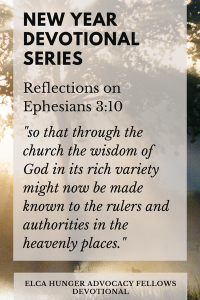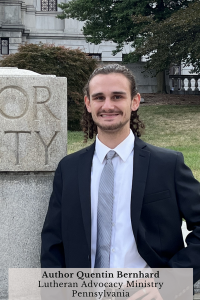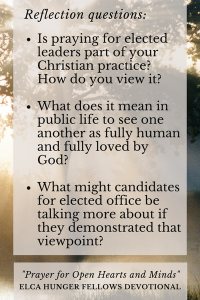by Quentin Bernhard, Lutheran Advocacy Ministry Pennsylvania [about the author]

 Praying for our leaders, especially those in elected office, came up in conversation during a fall 2023 meeting of the Lutheran Advocacy Ministry in Pennsylvania (LAMPa) Policy Council. Several people mentioned that it was difficult for members of congregations to do this in front of their fellow churchgoers, especially when it involved naming specific leaders and offices. Mere mention of an elected official’s name can elicit a sharp response, especially in our times of political polarization. It is at play in our expressly political institutions as well as in our families, our communities and our church.
Praying for our leaders, especially those in elected office, came up in conversation during a fall 2023 meeting of the Lutheran Advocacy Ministry in Pennsylvania (LAMPa) Policy Council. Several people mentioned that it was difficult for members of congregations to do this in front of their fellow churchgoers, especially when it involved naming specific leaders and offices. Mere mention of an elected official’s name can elicit a sharp response, especially in our times of political polarization. It is at play in our expressly political institutions as well as in our families, our communities and our church.
This polarization, and how to begin to depolarize both ourselves and our interpersonal relationships, was the topic of a LAMPa fall workshop on depolarization as an act of discipleship in a democracy. While the conversation did not linger on prayers for elected leaders and the role of these prayers in worship, it did bring to the surface the challenges we all face in embracing others in their fullness and complexity – across our sense of division, brokenness, and different understandings of our values. That fullness and complexity is at the heart of our common humanity and yet is so often overlooked in our world. This happens in part because of polarization but also because of the harms and injustices of colonialism, white supremacy and other dehumanizing modes of oppression.
 For me, praying for elected officials and candidates—and for all our leaders and community members, regardless of title or status—is a call for them to bring open hearts and minds, to open to the “mystery” of God, and to be open to be changed by it through Christ. It is also an act of hope, that peace and justice might be made real and that the Spirit of wisdom and revelation will allow our leaders to see our neighbors as they really are, fully human and fully loved by God.
For me, praying for elected officials and candidates—and for all our leaders and community members, regardless of title or status—is a call for them to bring open hearts and minds, to open to the “mystery” of God, and to be open to be changed by it through Christ. It is also an act of hope, that peace and justice might be made real and that the Spirit of wisdom and revelation will allow our leaders to see our neighbors as they really are, fully human and fully loved by God.
Caring about what our leaders do, and acting on that care, is an expression of our love for our neighbors and our faith in a future, transformed by Christ, that we are part of bringing about. When officials and candidates belittle our neighbors here and around the world, consider them deserving of unending bombardments and military assaults, and name them as threats to the United States and its supposed way of life, often defined in Christian nationalist terms, we fall short of seeing that humanity.
Our prayers are important. And our actions make our witness known to our leaders—as disciples and agents of change for God’s world.
ABOUT THE AUTHOR: Quentin Bernhard (he/him), ELCA Hunger Advocacy Fellow, is serving with Lutheran Advocacy Ministry in Pennsylvania (LAMPa) – an ELCA state public policy office – with Penn. roots and global perspective. After graduating from Muhlenberg College where he majored in history and political science and minored in Spanish, Berhard spent a year in Senegal through ELCA Young Adults in Global Mission. He has worked with community and advocacy organizations including the Allentown School District Foundation, the Lehigh Valley Zoo and the Climate Action Campaign, and is a member of New Life Evangelical Lutheran Church in New Tripoli, Penn.
